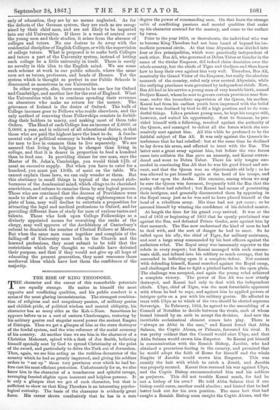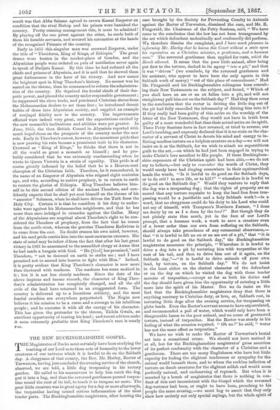THE RISE OF KING THEODORE.
THE character and the career of this remarkable potentate are equally strange. He unites in himself the most opposite and conflicting qualities, and his public conduct is a series of the most glaring inconsistencies. The strangest combina- tion of religious zeal and sanguinary passion, of military genius and childish pride, of political wisdom and mental obliquity, his character has as many sides as the Koh-i-Noor. Sometimes he appears before us as a sort of eastern Charlemagne, restoring by his military genius and singular moral power the ancient Empire of Ethiopia. Then we get a glimpse of him as the stern destroyer of the feudal system, and the wise reformer of the social economy of his country. At another time we see him in the character of a Christian Mahomet, spiced with a dash of Joe Smith, believing himself specially sent by God to spread Christianity at the point of the sword, and particularly to drive the Turk out of Jerusalem. Then, again, we see him acting as the ruthless devastator of the country which he had so greatly improved, and giving his soldiers orders to "eat up" those very provinces over which he had be- fore cast his most efficient protection. Unfortunately for us, we also know him in the character of a treacherous and spiteful savage, revenging fancied slights upon innocent and helpless persons. It is only a glimpse that we get of each character, but that is sufficient to show us that King Theodore is an interesting psycho- logical curiosity. The basis of the character is evidently great force. his career shows conclusively that he has in a rare
degree the power of commanding men. On that basis the strange mile'e of conflicting passions and mental qualities that make up his character contend for the mastery, and come to the surface by turns.
Prior to the year 1850, or thereabouts, the individual who was to become King Theodore had not been heard of beyond his fin- mediate personal circle. At that time Abyssinia was divided into four or five principalities, which were practically independent of each other. Has Ali, who governed at Debra Tabor or Gondar in the name of the titular Emperor, did indeed claim dominion over the whole country, but the chiefs of Tigre and Godjam and Shoa knew how to keep their own against him very well. Therefore, Has Ali, nominally the Grand Vizier of the Emperor, but really the absolute monarch of the country, ruled only over central Abyssinia, while the outlying provinces were governed by independent chiefs. Now, Has Ali had in his service a young man of very humble birth, named Dedjatz Kassai, whom he sent to govern certain provinces near Sen- naar, under the immediate supervision of the Queen, his mother. Kemal had from his earliest youth been impressed with the belief that he was destined by God to fill a high position and to do won- derful things. Like a prudent young man, he kept his tongue still, however, and waited his opportunity. Sent to Seunaar, he pro- vided himself with a following, revolted against the authority of the Queen, and managed to defeat all the forces which she suc- cessively sent against him. All this while he professed to be the faithful subject of Has Ali. It was only against the Queen's in- terference that he had rebelled : but at the same time he declined to lay down his arms, and affected to treat with the RIB. The latter sent a great army against him, but before the two forces came into collision the Has gave an amnesty, and Kassai surren- dered and went to Debra Tabor. There his wily tongue suc- ceeded in convincing Has Ali that he was his good friend and ser- vant, and that the Queen was an objectionable old lady ; so he was allowed to put himself again at the head of his troops, and make war upon the Arabs. His enemies, among whom we may be sure the Queen was foremost, frequently told the Has that the young officer had rebelled ; but Kassai had means of penetrating their intrigues, and generally disconcerted them by appearing in the Royal camp just as he was said to have placed himself at the head of a rebellious army. His time had not yet come ; so he amused himself by winning the confidence of his deluded master.
At length the time for his grand coup arrived. It was at the end of 1852 or beginning of 1853 that he openly proclaimed war against the Ras, and defeated Prince Goshu, sent against him by that monarch. The Ras now understood the kind of man he had to deal with, and the sort of danger he had to meet. So he called upon his ally, the chief of Tigre, for military assistance, and sent a large army commanded by his best officers against the audacious rebel. The Royal army was immensely superior to the rebels in every respect ; but Kassai managed with such consum- mate skill, and infused into his soldiery so much courage, that he succeeded in inflicting upon it a complete defeat. Not content with defending himself, Kassai marched against the Royal camp, and challenged the Has to fight a pitched battle in the open plain. The challenge was accepted, and again the young rebel achieved a complete victory. The power of Ras All was now utterly destroyed, and Kassai had only to deal with the independent chiefs. Ubye, chief of Tigre, was the most formidable opponent with whom he had to cope, and against him he applied powers of intrigue quite on a par with his military genius. He affected to treat with Ubye as to which of the two should be elected supreme Sovereign. In February, 1854, he agreed to the assembling of a Council of Notables to decide between the rivals, each of whom bound himself by an oath to accept the decision. And now the inevitable ecclesiastical element comes into play. There is "always an Abbe in the case," and Kassai found that Abba Salami, the Coptic Abuna, or Primate, favoured his rival. It was pretty evident that the Council would elect Ubye, and that Abba Salama would crown him Emperor. So Kassai put himself in communication with the Itomish Bishop, Jacobis, who had obtained a precarious footing in the country, and promised that he would adopt the faith of Rome for himself and the whole Empire if Jacobis would crown him Emperor. This was exactly the bait with which to catch a Jesuit, and Jacobis was properly secured. Kassai then resumed his war against Ubye, and the Coptic Bishop excommunicated him and his soldiers as perjurers. This did not trouble Kassai much, for had he not a bishop of his own? He told Abba Salaam, that if one bishop could curse, another could absolve; and hinted that he had better look out for his own position. The same bait that had caught a Romish Bishop soon caught the Coptic Abuna, and the result was that Abba Salama agreed to crown Kassai Emperor on condition that the rival Bishop and his priests were banished the country. Pretty cunning management this, it must be admitted! By playing off the one priest against the other, he made both of them his humble servants, and secured his coronation at the hands of the recognized Primate of the country.
Early in 1855 this singular man was crowned Emperor, under the title of " Theodoros, King of Mugs, of Ethiopia." The great drums were beaten in the market-place of Gondar, and the Abyssinian people were ordered on pain of mutilation never again to speak of Dedjatz Kassel. By this time he had reduced all the chiefs and princes of Abyssinia, and it is said that he showed them great forbearance in the hour of his victory. And now comes the brightest spot in King Theodore's history. No sooner was he seated on the throne, than he commenced to reform the administra- tion of the country. He deprived the feudal chiefs of their des- potic power, and placed the country under responsible government ; he suppressed the slave trade, and purchased Christian slaves from the Mohammedan dealers to set them free ; he introduced decent habits of dress into Abyssinian society, and supplied an example of conjugal fidelity new in the country. The improvements effected were indeed very great, and the expectations excited by the new monarch's inclinations and abilities were yet greater. In June, 1855, the then British Consul in Abyssinia reported with much hopefulness on the prospects of the country under the new rule. Early in Theodore's career, however, the monstrous pride that is now proving his ruin became a prominent trait in his character. Crowned as "King of Kings," he thiuks that there is not in all the world so great a monarch as himself ; and he pro- bably considered that he was extremely condescending when he wrote to Queen Victoria in a strain of equality. This pride is of course greatly inflamed by the belief that he is a Heaven-sent champion of the Christian faith. Theodore, be it remembered, is the name of an Emperor of Abyssinia who reigned eight centuries ago, and who, according to native prophecy, is to return to earth to restore the glories of Ethiopia. King Theodore believes him- self to be this second edition of the ancient Theodore, and con- fidently expects that he shall yet seat himself on the throne of his " ancestor " Solomon, when he shall have driven the Turk from the Holy City. Certain it is that he considers it his duty to under- take wars against his Mohammedan neighbours, and that he has more than once indulged in crusades against the Gallas. Many of the Abyssinians are sceptical about Theodore's right to be con- sidered the Theodore of prophecy, from the fact that he comes from the north-west, whereas the genuine Theodorus Redivivus is to come from the east. No doubt crosses his own mind, however, and his mad pride carries him into the most enormous excesses. His state of mind may be inferr,d from the fact that after his last great victory in 1861 he announced to the assembled clergy at Axum that he had made a bargain with God. "He [God] has promised," said Theodore, "not to descend on earth to strike me ; and I have promised not to ascend into heaven to fight with Him." Indeed, it is pretty evident that King Theodore's character is now more than tinctured with madness. The madness has some method in it ; but it is not less clearly madness. Since the date of the above impious and insane remark, the character of King Theo- dore's administration has completely changed, and all the old evils of the land have returned in an exaggerated form. The country is delivered up to a licentious soldiery, and the most fearful cruelties are everywhere perpetrated. The Negia now believes it his mission to be a curse and a scourge to his rebellious people ; and he executes it with all the energy of his character. This has given the pretender to the throne, Tiidela Gwala, an excellent opportunity of rearing his head ; and recent advice,s make it seem extremely probable that King Theodore's race is nearly run.































 Previous page
Previous page